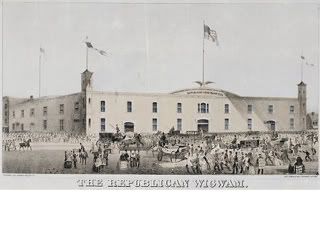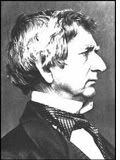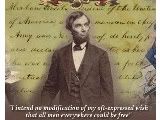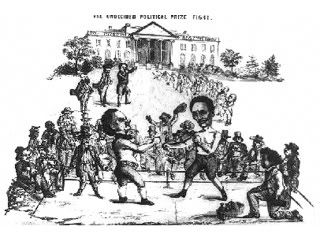In 1856, the Republican Party met for the first time to put together a platform
http://alpha.furman.edu/~benso…
and ready itself for the first presidential run. Chicago was chosen for the first convention. The convention was held at the Wigwam,

a wooden structure built expressly for the convention. The Republican Party appointed delegates at the state level. These people were chosen to determine the best candidate to represent the party in the general election.
Cross posted at EENR
This convention was called to order May 16, 1861 before the “largest, most brilliant, and most enthusiastic party gathering yet seen in the country”.(Allan Nevins, historian). Governor Morgan of Illinois began with…guess what…you got it, an attack on the Democratic Party. The evil Democratic Party, among other nefarious things “which, if done directly would bring a blush even to the cheek of modern democracy” (Governor Morgan, in opening speech), was mounting an attempt to amend the constitution to insert a slave code. Yes, Virginia, the Republican Party was once the party dedicated to humanity and decency.
Let us pause for a moment and look at Abraham Lincoln.
About his lawyering ability:
“The idea that Mr. Lincoln was a great lawyer in the higher courts and a good nisi prius lawyer, and yet that a child or student could manage a case in court better than he, seems strangely inconsistent, but the facts of his life as a lawyer will reconcile this and other apparent contradictions,” maintained partner William H. Herndon. “I easily realized that Lincoln was strikingly deficient in the technical rules of the law. Although he was constantly reminding young legal aspirants to study and ‘work, work,’ yet I doubt if he ever read a single elementary law book through in his life. In fact, I may truthfully say, I never knew him to read through a law book of any kind. Practically, he knew nothing of the rules of evidence, of pleading, or practice, as laid down in the text-books, and seemed to care nothing about them. He had a keen sense of justice and struggled for it, throwing aside forms, methods, and rules, until it appeared pure as a ray of light flashing through a fog-bank.”
About his future in politics:
The polls had barely closed on the 1858 election when Jeriah Bonham wrote an editorial for the Illinois Gazette predicting the candidates for the 1860 presidential nomination: “Douglas will lead the cohorts of slavery. Lincoln should lead the hosts of freedom in this ‘irrepressible conflict.’ Who has earned the proud position as well as he? as he is in himself the embodiment and exponent of our free institutions.
Does this sound familiar?
Abraham Lincoln nurtured his 1860 presidential candidacy while politely denigrating it. During 1859, Mr. Lincoln was simply one of many Republicans who were mentioned as a possible alternative to the frontrunner for the Republican presidential nomination: New York Senator William H. Seward. But several actions occurred in 1859 and early 1860 which helped advance Mr. Lincoln’s chances. The first was the selection of Chicago as the site of the Republican convention – a decision shrewdly engineered by the Illinois Republican chairman Norman B. Judd to give Mr. Lincoln the home court advantage. The second was reaction to Mr. Lincoln’s Cooper Union speech in February 1860 – which thrilled Northeastern Republicans unacquainted with this western lawyer and his unique approach to discussing national issues.
Republicans who sought an alternative to Senator Seward had a new option. Presenting his case for why he should allow his name to be promoted as a Republican presidential candidate in 1860, friend Jesse W. Fell argued: “What the Republican party wants, to insure success in 1860, is a man of popular origin, of acknowledged ability, committed against slavery aggressions, who has no record to defend, and no radicalism of an offensive character….”
Back to our story.
The Republican Party was jubilant as it went with great national approval to their first convention. The brave anti-slavery stance had made them popular with the northern states, which had the greatest voting populations. William Seward, a New York lawyer and statesman, 
promoted progressive political policies including prison reform and increased spending on education. This included the idea of schools for immigrants taught in their own language. But this was not the least of his radicalisms.
In 1848 Seward entered the Senate and over the next few years emerged as the leader of the anti-slavery wing of the Whig Party. An opponent of the Fugitive Slave Act, he defended runaway slaves in court. In 1850 Seward claimed in a speech that if slavery was not abolished America would become embroiled in a civil war. He continued to argue this point of view over the next ten years.
Going into the Republican convention, Seward made an error in campaigning. He began to move to the center, softening his views on slavery in an effort to gain the nomination. This had the usual ugly result of adding people who questioned his honesty to the batch who feared his radical stance that black men should not only be free, but have the right to vote.
Lincoln fast emerged as the true centrist, unifying candidate in many people’s eyes. He speechified that slavery should not be “decided by violence, but by the ballot box,” on the day John Brown was executed in Kansas. His road tour was often met with so many people that they had to move his speaking sites. Lincoln publicly called for peace with the south and asked for patience and faith in the system to work out the slavery issue.
The convention drew delegates from 24 states. A Texas delegate arrived (yea, Texas!), but its origins were disputed and they were not allowed to join in.
The largest delegation of 70 men was from New York and unofficially led by Sewards political manager, Thurlow Weed, who was certain Seward would gain the nomination. Horace Greely led the anti-Seward forces, but even he thought Seward was the sure bet. Lincoln had David Davis, a trusted friend and Norman Judd as his representatives. Neither Seward or Lincoln attended the convention as that was viewed as ‘unseemly’.
Weed plied the delegates with champagne and promises of ‘oceans of money’ to follow them home once the nomination was secured. Davis and Judd worked the anti-Seward factions quietly. Seward marched his group of followers to the Wigwam on the third day behind a uniformed brass band. They walked to streets to the tune, “Isn’t he a Darling.” When they arrived at the Wigwam, they found themselves outfoxed by Lincoln and his gathered allies. Counterfeit tickets to the convention had been printed up and distributed. The gallery was already filled with noisy Lincoln supporters before the Seward followers hit the front door with their properly attained tickets. No one will ever know how much difference the crowd made who cheered and stomped the gallery floor every time Lincoln’s name was uttered.
The first vote was 173 for Seward and 107 for Lincoln. On the second ballot, Vermont was the first state to begin the defection with 4 votes switching to Lincoln. It was a vote here, a couple there, but the way was becoming clear. The final tally on the second vote: Seward 184, Lincoln 181.
A hush fell over the great hall. Lincoln’s numbers continued to increase. At the end of the third vote, Lincoln had 231 and ½ votes. Note sure how the heck he got a half vote, but people, these fine tales do not have to be made up. They are the gospel. Lincoln was 1 ½ short the needed votes to take it home. All eyes turned to D. K. Carter of Ohio (later a great representative and senator for Montana) who stuttered, “I- I rise, Mr Chairman, to a-anounce the ch-change of four votes, from Mr. Chase to Abraham Lincoln!” The cheering crowd within the Wigwam was so deafening that the only way people could tell that cannons were being fired outside was from seeing the smoke drifting from the barrels.
Seward went on to become Lincoln’s secretary of state. The civil war was to be inevitable. Would it have come quicker had Seward gained the nomination and the presidency? No one knows. One never knows what the future might bring when selecting a leader. But the shenanigans of the primary were quickly forgotten and the America moved on to a piece of history even the centrist Lincoln could not stave off.
As Kurt would say, so it goes.

Want to learn more?
http://www.chicagohs.org/histo…
http://www.mrlincolnandfreedom…
http://en.wikipedia.org/wiki/T…
http://www.spartacus.schoolnet…
http://www.abrahamlincolnsclas…


14 comments
Skip to comment form
Author
This could well be the first in a series. Great primaries are so much a part of the American landscape. We strive, we plot and scheme and we continue the fight for freedom, decency, and dammit, the true American way, with all its wonder and its warts.
Great stuff this:
Ain’t Democracy just wonderful?
One note: While never becoming President, Seward still holds an important place in US History for his famous Folly.
cool topic.
Please do consider doing so, I would really enjoy it, and I suspect others would as well.
Author
for the kind words. I pull 12 hour shifts when I work so occasionally, my responses will be greatly delayed. I apologize for that.